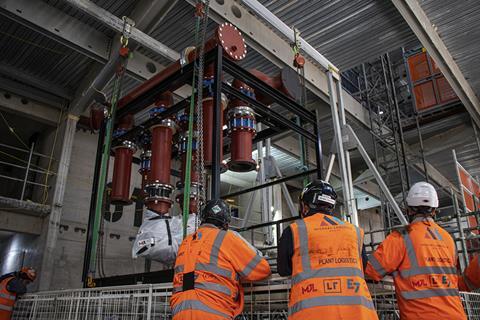Last year’s business failures have hit a nerve. Firms finally seem fed up with construction’s rough and tumble, writes Dave Rogers
Last week, a report by Mace made headlines because, in a nutshell, it warned clients not to accept the lowest possible bids on jobs because they ran the very real risk of firms going bust on their schemes.
The report did not actually say it in such plain English, but that is what it meant. Whether clients choose to listen is up to them but, for many, the answer is pretty straight forward: they won’t.
Firms going under does no one any good. There is no revelling in a business sinking, an opportunity opened up because of the distress of a rival. When those rumours about ISG surfaced last year, its peers were terrified. Why? Because the firm’s supply chain will be hit too. ISG might not like those rumours but no one wants to see it collapse.

Laing O’Rourke posting massive losses does no one any good, too. When was the last time that O’Rourke, the country’s biggest private contractor, appeared on a bid list for, say, a tall tower in London? This is the firm that built The Cheesegrater after all.
Hit by problems which its chairman, Sir John Parker, referenced as including “new clients, with high-value projects, requesting major design changes post-contract”, O’Rourke has been increasingly switching its focus away from commercial schemes to what group chief executive, Ray O’Rourke, called “strategic sectors”.
These include healthcare, education, science and research and data centres. That means the talent pool, already not extensive, for certain jobs shrinks by one.
A lot of headlines have been made recently about Manchester United wanting to rebuild its Old Trafford stadium. What hasn’t really been answered is this: who on Earth will build it?
A major contractor recently went through the list of would-be bidders for the Old Trafford rebuild and concluded that none would do it, including his own firm
O’Rourke could but it was supposed to be working on the expansion of Manchester City’s ground and failed to agree a price. So that was the end of that. To the outsider, why would Manchester United be any different?
A major contractor recently went through the list of would-be bidders for the Old Trafford rebuild and concluded that none would do it, including his own firm. It could well go to an overseas contractor, possibly from the US, because it seems no one here has the stomach for the job.
In that Mace report, beyond the headline-grabbing lines about clients was a section that was equally interesting and referenced a trend that seems to be becoming more and more prevalent.
“The insolvencies that besieged the industry last year not only persist as a problem for live projects but leave a shadow of ongoing reduced competitiveness,” it warns.
“In some cases, the drop in the number of specialist subcontractors as a result of insolvencies, and the stronger hand those still operating subsequently hold, is pushing prices up and leaving some contractors with little choice but to accept. Naturally, when developers are trying to tighten budgets, this can create an impasse.
“It is not uncommon to see examples of falling competition and risk aversion outweighing concerns about a lack of projects and economic weakness.”
Some might sense an opportunity to jack up prices as competition dwindles – and, frankly, who can blame them? – but the penny seems to have dropped with many on risk aversion.
>> See also: ‘The industry is broken.’ The soul-searching begins as London M&E specialist succumbs to familiar foes
How many remains to be seen – and order books can dwindle only for so long before the situation becomes business critical – but the sentiment does seem to be that firms, main contractors and especially specialists, have had enough.
The prospect of working on a major job, for example the rebuild of Old Trafford, does not automatically mean grateful firms will trample over their grannies to get to work on it.
When the chance to rebuild Wembley stadium came up at the end of the 1990s, these were the bidders: a pairing of Bovis and Multiplex; Mowlem and a Sir Robert McAlpine and Taylor Woodrow team. Leaving aside Mowlem, as it no longer exists after being bought by Carillion, which also no longer exists, how many of those firms would bid for a job like Wembley again?
Mace’s report warns clients and others to brace themselves for more and more firms turning down the chance to bid for obs. “How these conflicting forces [risk aversion and lack of work] interact will have a huge impact on project specific tenders and, while average tender price inflation will ease, difficult conversations will not.”

Kelly Boorman, head of construction at accountancy specialist RSM, says she has noticed more and more contractors not bidding for jobs, turning opportunities down. “It feels like the industry is trying to take control of margins preservation,” she says. “Where there is uncertainty, firms are stepping away.”
This was the theme of a comment piece in these pages a few weeks ago. Its author, Mike Wharton, the chief executive of a roofing contractor called Complete Roofing Systems, wrote that he’d had enough of running into the same things over and over again.
He said: “The days of main contractors being able to metaphorically seduce specialists are over. We’ve been talking about how to ‘do things better’ in the industry for years, and it hasn’t changed.
“The time for talking at the Department for Business and Trade, the Construction Leadership Council workshops, endless Zoom calls about ‘collaboration’ – it needs to stop. The race [to the bottom] is over. All the hurdles have been flattened by various clumsy athletes and the bunting has been taken down.
“We are already at the bottom, as can be seen in cruel black and white by the failures of large main contractors throughout 2023.”
A couple of observers seemed to miss the point, with someone suggesting on LinkedIn that “rants” should be confined to Twitter, while another wondered: “Am guessing the bloke doesn’t have a great deal of tendering activity going forward?” But that misses the point. Firms are wondering: why bother?
Wharton touches on one absurdity, telling main contractors: “Specialist installers are just that: installers. Why is it then that you start your tender letter with the line: ‘You must take full design liability’?” adding, pithily: “If you have entered into a design and build contract, then that is for you to manage.”
If you push all risks down to us and the sharing is not proportionate, we will simply say no, because it is indicative of a relationship which will be confrontational (and critically, not profitable) from the start
Mike Wharton, Complete Roofing Systems
There are many Mike Whartons out there – judging by the number of comments on LinkedIn from those agreeing with him.
He added: “If you push all risks down to us and the sharing is not proportionate, we will simply say no, because it is indicative of a relationship which will be confrontational (and critically, not profitable) from the start. If you want to take a risk with your business, that is your choice, but please respect the fact that, just as you have your policies, we too have ours.”
Maybe 2023 was construction’s year zero moment and the failure of MJ Lonsdale seemed to prick many. One bidder on a very large scheme in London says the job should have been awarded several weeks ago but still hasn’t because the client is carrying out forensic due diligence on the bidders’ financial numbers.
“This sort of thing has increased a lot since Lonsdale went under,” he adds.
Morgan Sindall chief executive John Morgan says it time and again, but a strong balance sheet is becoming more and more of an asset nowadays. It always has been, but now it is equally as much of a calling card as a firm’s track record on jobs.
“Having a very strong balance sheet with a lot of cash is very helpful,” Morgan adds. “Clients are very interested in that. A strong balance sheet tells clients you’re not going to go bust on them and you will pay your supply chain on time.” Yesterday, Wates boss Eoghan O’Lionaird said pretty much the same thing.
All the pieces of the jigsaw to make everything fit together well should be somewhere on the same table: a strong balance sheet; a decent margin; a contract that doesn’t squeeze the signatory until the pips squeak. It should be basic stuff for the business of construction.

A few days after his article was published, Wharton got in touch. “Why wouldn’t [main contractors] want to engage to discuss the issues in a positive way and how best to collectively resolve,” he says. “I’ll sit down with any half-decent contractor to discuss it as long as the right people are at the table.”
But he is not too confident right now, lamenting: “Interesting that the only main contractors getting involved are ones we work with.”


























No comments yet